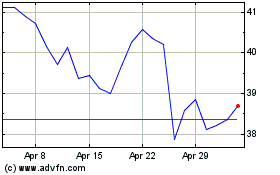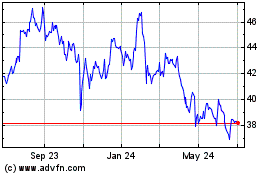ESPN, TNT Face Lost Revenue After NBA Suspends Season Over Coronavirus
March 12 2020 - 2:03PM
Dow Jones News
By Benjamin Mullin and Lillian Rizzo
The National Basketball Association's suspension of its season
over the coronavirus will have major fallout for its TV partners,
hitting their advertising revenue and potentially leaving them on
the hook for big rights-fees payments, according to analysts and
people familiar with the NBA's rights deals.
Walt Disney Co.'s ESPN and AT&T Inc.'s Turner, the parent of
TNT, together spend about $2.7 billion annually to show games
nationally. In addition, regional sports networks owned by media
giants such as Comcast Corp. and Sinclair Broadcast Group Inc.,
among others, air NBA games in local markets.
Losing NBA games will leave a major hole in the TV networks'
prime-time schedules, translating into lower ratings that will harm
their ad sales -- especially if the season doesn't resume for the
playoffs that normally begin in April, analysts said.
In the last NBA season, TV networks brought in nearly $600
million in ad revenue from NBA games and $972 million from the
playoffs, according to research firm Kantar.
Networks' other major stream of revenue -- from the
channel-carriage fees paid by cable-TV distributors -- also could
be impacted. Distributors require some TV programmers to air a
minimum number of games; if they don't, the carriage fees could be
cut, according to a report by Rich Greenfield, an analyst for
LightShed Partners. Since most of the TV season is complete, he
said, many TV programmers may have met the quota for telecasts.
As networks assess the possible damage, a major variable ais how
soon the league can resume play. If it can do so relatively
quickly, the worst business impact could be avoided, people close
to the networks say.
Mark Cuban, owner of the Dallas Mavericks and a streaming-video
entrepreneur, called the suspension of the NBA games due to the
coronavirus a "black swan event," adding that the league and its
partners are "in new territory."
"In terms of impact on media, it really depends on how the virus
plays out," Mr. Cuban said in an email. "The NBA and major media
companies will have to focus on the health and safety of their
employees and stakeholders. That will drive all
decision-making."
The NBA's suspension could have wider implications for the pay
television industry. Cable and satellite TV providers have lost
millions of subscribers to cord-cutting over the past several
years.
Live sports has been one of the major selling points of the
traditional TV bundle. The NBA's suspension could potentially
accelerate pay-TV cancellations, said Michael Nathanson, an analyst
for MoffettNathanson.
"We worry about seasonal churn," Mr. Nathanson said. "We think
sports is the glue for subscribers."
It's unclear whether the networks will be required to pay rights
fees for the full NBA season even though they aren't airing games.
Some media executives likened the season's suspension to the
1998-1999 NBA season, which was shortened due to a lockout. That
year, networks still paid rights fees.
Media contracts, including sports-rights deals, often include
exit clauses for both sides for catastrophic events, but it isn't
certain that those would apply in this case. The league could work
with TV networks to help them mitigate any losses from advertising
and distribution partners, including by letting them air more NBA
games in subsequent seasons, the people familiar with the NBA
rights deals said.
"This is an unprecedented situation," ESPN said in a statement.
"We have great relationships with our league partners and are
confident we can address all issues constructively going forward.
Our immediate focus is on everyone's safety and well-being."
A Turner Sports spokesman said the company is supportive of the
NBA's decision to "protect the health and well-being of everyone
involved." Turner's networks also air the NCAA basketball
tournament, which as of Thursday morning was planning to go ahead
without fans in stadiums.
Sinclair, which owns more than 20 regional sports networks,
including many that air NBA games, anticipates scenarios such as
this in its TV-rights agreements, said Jeff Krolik, president of
Sinclair's local sports unit. The company will continue to monitor
the situation and hold discussions with the league, teams and
pay-TV providers, he said.
David Levy, the former head of Turner Sports who struck the
unit's multibillion-dollar deal with the NBA, said that major
networks' first business priority should be preserving their
long-term relationships with leagues by supporting their decision
to protect their players.
"I wouldn't be thinking about profits and revenues at this
moment," Mr. Levy said. "I would be thinking about our employees
and our country."
(END) Dow Jones Newswires
March 12, 2020 13:48 ET (17:48 GMT)
Copyright (c) 2020 Dow Jones & Company, Inc.
Comcast (NASDAQ:CMCSA)
Historical Stock Chart
From Mar 2024 to Apr 2024

Comcast (NASDAQ:CMCSA)
Historical Stock Chart
From Apr 2023 to Apr 2024
